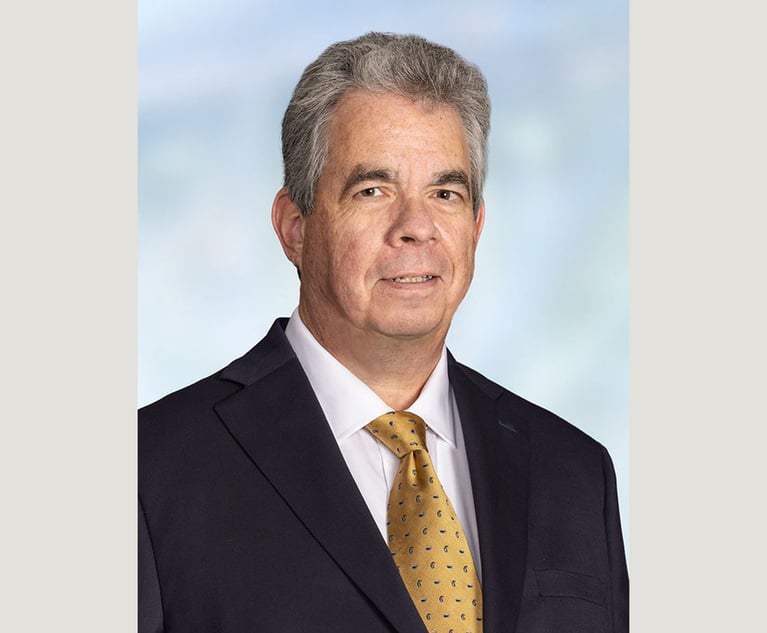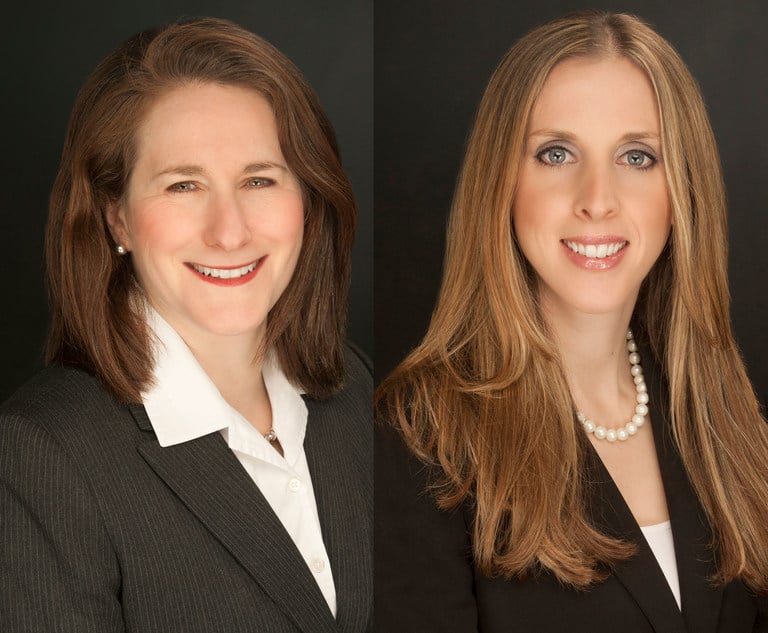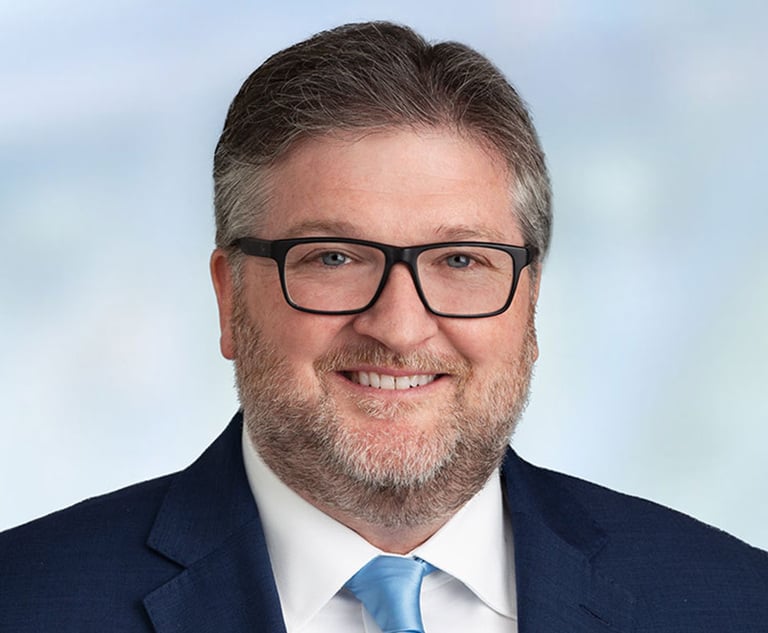 Rebecca Rosenberger Smolen, left, and Amy Neifeld Shkedy, right, of Bala Law Group.
Rebecca Rosenberger Smolen, left, and Amy Neifeld Shkedy, right, of Bala Law Group.Estate Planning During the Pandemic: Challenges and Solutions
We have seen an uptick in estate planning interest both from new and existing clients, and expect to see more when things get back to "normal."
May 04, 2020 at 12:41 PM
4 minute read
Like everyone else, we certainly have had our share of personal and professional challenges, while navigating this unprecedented period of our lives, during the global COVID-19 pandemic. The silver lining for us, which may be unique to our practice area, is that many folks confronted with their own mortality and that of their loved ones (and lots of extra time on their hands) are now realizing that the time to focus on estate planning is before there is a real crisis for them. Previously, this would regularly happen in isolated instances, when a family member or peer would die suddenly or prematurely. Now, we are all simultaneously having the opportunity for this important and motivating epiphany.
Americans are woefully under estate planned. For that to change, it would probably help to have a catchy promotional ad campaign, like the dairy industry's "Got Milk?" campaign of yore (perhaps, "Got wills?") strewn across billboards around the country and on radio and TV ads as a public service announcement. The stark realities of the COVID-19 crisis appear to be serving as a decent "Plan B" to help accomplish the same result.
We have seen an uptick in estate planning interest both from new and existing clients, and expect to see more when things get back to "normal." Because of the social distancing rules, we, of course, are not meeting in person with clients for the time being. So far, we've been able to navigate the normal in-person meeting process to discuss an estate plan, or updates, via telephone calls and emails.
To date, we've been able to avoid the need for video conferences with our clients (but, of course, couldn't avoid a court-ordered Skype conference). Nevertheless, it seems clear, that this medium for engagement will likely become a new aspect of our practice in the years to come. Like Pandora's Box—it's going to be hard to avoid it becoming part of the new normal now that board meetings, court conferences, and, let's not forget, happy hours, are being held in this manner. At least while we are in this surreal global self-quarantine mode, with its concomitant relaxed grooming habits, we have so far managed to escape the need to become "camera ready" for every client call.
As has been previously reported in the Legal, there is a new "temporary" law in Pennsylvania allowing for remote notarization via video conferencing. We haven't yet started working with that approach, for several reasons. First, it's temporary and we have found workarounds for clients where document executions have been necessary. Second, it requires the use of software that is new and unfamiliar in our practice area. Third, it doesn't necessarily solve the issue of the need to obtain additional witnesses. Finally, it requires retaining the video footage for 10 years, which seems to be a bit of overkill for our practice area. In our view, there should also be a way for attorneys to vouch for a client known to them to have signed a document without needing to have video footage at all. It seems that phone conversations in the normal course of business would be adequate for this purpose in nearly all situations.
Most of our signing meetings have been postponed until after things get back to normal (or at least a bit closer thereto). When desired by a client, the workaround we have generally used, to date, has involved meeting in the parking lot and maintaining appropriate social distance. (Of course, the weather must cooperate for that to work.) We have also encouraged clients to sign documents without a notary, with the goal of signing again in a formal manner with witnesses and notary present, when circumstances will allow. This generally works for all documents except deeds and powers of attorney. Since the first phase of returning to semi-normalcy appears to allow meetings of under 25 people, we should expect to be able to resume our normal document signing ceremonies with four to five people present (perhaps with gloves, separate pens and masks for the foreseeable future), within the next few months.
Rebecca Rosenberger Smolen and Amy Neifeld Shkedy are members and co-founders of Bala Law Group. They focus their practices on tax and estate planning.
This content has been archived. It is available through our partners, LexisNexis® and Bloomberg Law.
To view this content, please continue to their sites.
Not a Lexis Subscriber?
Subscribe Now
Not a Bloomberg Law Subscriber?
Subscribe Now
NOT FOR REPRINT
© 2024 ALM Global, LLC, All Rights Reserved. Request academic re-use from www.copyright.com. All other uses, submit a request to [email protected]. For more information visit Asset & Logo Licensing.
You Might Like
View All
Former Perkins Coie Partner Moves to Stradley Ronon in Chicago

Proskauer Rose Investment Management Trio Jumps to Stradley Ronon


Stradley Ronon Bolsters Investment Management Practice With Vanguard Hire
4 minute readTrending Stories
- 1Decision of the Day: Judge Reduces $287M Jury Verdict Against Harley-Davidson in Wrongful Death Suit
- 2Kirkland to Covington: 2024's International Chart Toppers and Award Winners
- 3Decision of the Day: Judge Denies Summary Judgment Motions in Suit by Runner Injured in Brooklyn Bridge Park
- 4KISS, Profit Motive and Foreign Currency Contracts
- 512 Days of … Web Analytics
Who Got The Work
Michael G. Bongiorno, Andrew Scott Dulberg and Elizabeth E. Driscoll from Wilmer Cutler Pickering Hale and Dorr have stepped in to represent Symbotic Inc., an A.I.-enabled technology platform that focuses on increasing supply chain efficiency, and other defendants in a pending shareholder derivative lawsuit. The case, filed Oct. 2 in Massachusetts District Court by the Brown Law Firm on behalf of Stephen Austen, accuses certain officers and directors of misleading investors in regard to Symbotic's potential for margin growth by failing to disclose that the company was not equipped to timely deploy its systems or manage expenses through project delays. The case, assigned to U.S. District Judge Nathaniel M. Gorton, is 1:24-cv-12522, Austen v. Cohen et al.
Who Got The Work
Edmund Polubinski and Marie Killmond of Davis Polk & Wardwell have entered appearances for data platform software development company MongoDB and other defendants in a pending shareholder derivative lawsuit. The action, filed Oct. 7 in New York Southern District Court by the Brown Law Firm, accuses the company's directors and/or officers of falsely expressing confidence in the company’s restructuring of its sales incentive plan and downplaying the severity of decreases in its upfront commitments. The case is 1:24-cv-07594, Roy v. Ittycheria et al.
Who Got The Work
Amy O. Bruchs and Kurt F. Ellison of Michael Best & Friedrich have entered appearances for Epic Systems Corp. in a pending employment discrimination lawsuit. The suit was filed Sept. 7 in Wisconsin Western District Court by Levine Eisberner LLC and Siri & Glimstad on behalf of a project manager who claims that he was wrongfully terminated after applying for a religious exemption to the defendant's COVID-19 vaccine mandate. The case, assigned to U.S. Magistrate Judge Anita Marie Boor, is 3:24-cv-00630, Secker, Nathan v. Epic Systems Corporation.
Who Got The Work
David X. Sullivan, Thomas J. Finn and Gregory A. Hall from McCarter & English have entered appearances for Sunrun Installation Services in a pending civil rights lawsuit. The complaint was filed Sept. 4 in Connecticut District Court by attorney Robert M. Berke on behalf of former employee George Edward Steins, who was arrested and charged with employing an unregistered home improvement salesperson. The complaint alleges that had Sunrun informed the Connecticut Department of Consumer Protection that the plaintiff's employment had ended in 2017 and that he no longer held Sunrun's home improvement contractor license, he would not have been hit with charges, which were dismissed in May 2024. The case, assigned to U.S. District Judge Jeffrey A. Meyer, is 3:24-cv-01423, Steins v. Sunrun, Inc. et al.
Who Got The Work
Greenberg Traurig shareholder Joshua L. Raskin has entered an appearance for boohoo.com UK Ltd. in a pending patent infringement lawsuit. The suit, filed Sept. 3 in Texas Eastern District Court by Rozier Hardt McDonough on behalf of Alto Dynamics, asserts five patents related to an online shopping platform. The case, assigned to U.S. District Judge Rodney Gilstrap, is 2:24-cv-00719, Alto Dynamics, LLC v. boohoo.com UK Limited.
Featured Firms
Law Offices of Gary Martin Hays & Associates, P.C.
(470) 294-1674
Law Offices of Mark E. Salomone
(857) 444-6468
Smith & Hassler
(713) 739-1250





